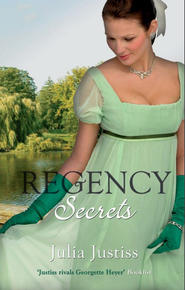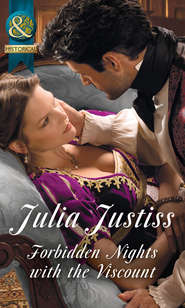По всем вопросам обращайтесь на: info@litportal.ru
(©) 2003-2025.
✖
Regency Rogues: Stolen Sins: Forbidden Nights with the Viscount (Hadley's Hellions) / Stolen Encounters with the Duchess (Hadley's Hellions)
Автор
Год написания книги
2019
Настройки чтения
Размер шрифта
Высота строк
Поля
‘I shall be the soul of diplomacy.’
‘Giles, the most hot-headed member of our group?’ David retorted. ‘Just remember that resolution, if you encounter George when I’m not there to restrain you. It would be…undignified for a rising Member of Parliament to mill down a former Member in public.’
‘Besides which, George would be sure to haul me up on assault charges. Temper or no, I promise to be on my best behaviour.’
And he would be, Giles promised himself as he walked out to hail a hackney.
Several hours later, dinner and consultation with Lord Grey and two of his ministers complete and a sheaf of notes in hand, Giles had just left the small private dining room when an unwelcome voice assailed his ears.
Hearing his name called again, he turned towards the card room, girding himself for the always unwelcome encounter with his half-brother.
‘It is you, then,’ George said, and walked towards him.
At least he’d won that small satisfaction, Giles thought as he waited for his half-brother to approach: George had finally learned that Giles would not come running to him when his half-brother beckoned, like the lackey George wanted him to be.
As the man proceeded closer with his measured, self-important tread, Giles noted he was splendidly dressed, as usual, in a dark coat featuring the newly popular cinched-in waist, an elaborately tied cravat of fine linen with a large diamond winking out from the knot, and long trousers. A walking advertisement for his tailor, and for being a man who spared no expense on his person.
George stopped beside him, looking him in the eyes for a moment without speaking. His half-brother was of a height, but had the fairer hair and hazel eyes of their father and a pleasant face that, when it wore a congenial look Giles seldom saw, was accounted handsome, or so numerous society ladies seemed to think.
Apparently Lady Margaret wasn’t of their number. That recollection pleased him more than it should.
When Giles refused to rise to the bait of asking his brother to tell him what he wanted, at length George broke the silence. ‘Didn’t believe at first you’d actually entered a gentleman’s club, instead of hobnobbing with the lowborn sorts you usually associate with. Devil’s teeth, to think how much blunt Lord Newville must have dropped, bribing the members to get you accepted here! But in this instance, I suppose I should thank him for sparing me having to track you down in that dive you frequent.’
Drawing in a deep breath through his gritted teeth to stem the rising anger, Giles made no immediate response. He’d long ago figured out the best way to deal with his half-brother’s demeaning remarks was to ignore them, no matter how infuriating—thereby depriving George of the satisfaction of provoking him.
‘Do you having anything of substance to say, or did you just want to tender the usual insults?’ he said in a tone as bored as he could manage. ‘If the latter, I’ll bid you goodnight.’ With a nod of dismissal, he turned to go.
‘Wait! I do have something else to say.’ George stayed him.
Much as Giles would love to snub him and walk out, if his half-brother truly wanted to speak with him, leaving now would only delay the confrontation. Tenacious as a bulldog, George would simply run him down somewhere else.
Wondering what his brother could possibly wish to discuss with him—unless he’d already figured out a way to blame Giles for his electoral defeat—he raised an eyebrow. ‘Perhaps you might wish to do so somewhere more private than Brooks’s entry hall?’ With a gesture, he indicated a small anteroom.
After George followed him in, Giles said, ‘I’ve still got work to do tonight, so I’d appreciate your keeping this short.’ With what he considered true nobility, he refrained from adding that it involved important business for the new Parliament—the one in which George would not be serving. After closing the door, he said, ‘Shall we dispense with the charade of exchanging pleasantries? Just say what you must.’
‘I will be brief. I’m warning you to leave Lady Margaret Roberts alone. She’s a gentlewoman from a distinguished family, her father a nobleman highly regarded by his peers. Neither need be embarrassed by it becoming known that she associated with you. And at a common inn, no less.’
Baffled, Giles stared at George—until his mind made the connection. ‘You mean, in Chellingham?’
‘As far as I know, that’s the only time she’s displayed such a lapse of judgement. Although I understand there was some disturbance that necessitated her removal, and that at the time she let you make off with her, she was not aware of who you were.’
‘It being more acceptable for the lady to leave with a stranger than to leave with me?’ Giles inserted.
‘Well, of course she shouldn’t be leaving with a stranger! Armsburn and Proctor were highly negligent in leaving her alone to begin with. Although it would have been better still if she’d not put herself forward, campaigning for her cousin.’
Although admittedly Giles was not conversant with who belonged to which circle of friendship among the Tory membership, he was not aware that Lady Margaret’s cousin and his half-brother were close. And if they were not…
‘How did you know what happened to Lady Margaret in Chellingham?’ When his half-brother stuttered for an answer, Giles voiced the unbelievable, but only logical, conclusion. ‘You weren’t having someone spy on her, were you, George?’
‘Someone should keep tabs on her, since it’s obvious neither her cousin nor his aide were doing such a good job of it,’ his half-brother replied defensively.
There could be but one reason for George to go to the trouble of having the lady watched: he must be set on marrying her. Even so, the behaviour was unsettling, and definitely raised his hackles on Lady Margaret’s behalf.
‘Is Lord Witlow aware of your…protective oversight?’ He knew Lady Margaret couldn’t be—and was reasonably sure what that lady’s response would be if she found out.
‘Lord Witlow would be gratified that I concern myself with the welfare of his dearest daughter,’ George replied loftily.
So her father wasn’t aware of the scrutiny either. Which made the behaviour even more disturbing. ‘He might also not appreciate having someone wholly unrelated keeping his daughter under observation.’
George gave an impatient wave. ‘My motives are of the purest. Besides, I cherish hopes that we will not long remain “unrelated”.’
So George did intend to press his suit. ‘You’ve spoken with his lordship on this matter?’
‘He’s doubtless aware of my regard,’ George evaded.
‘And the lady?’
‘I haven’t as yet formally declared myself,’ George admitted. ‘But on a matter as important as family alliances, she will follow her father’s guidance, and he will certainly approve. Now that I have revealed my honourable intentions, I expect even someone like you to respect them, and not sully the lady with associations that could only be to her detriment.’
Keeping a tight hold on the simmering anger he didn’t seem able to completely suppress, Giles said evenly, ‘I would do the lady the honour of allowing her to choose with whom she wishes to associate.’
George stared at him a moment. ‘Meaning, you do intend to pester her with your attentions?’
‘I have never “pestered” a woman,’ Giles retorted. ‘If a lady indicates she is uninterested in my company, I am not so boorish as to inflict it upon her.’ That shot flying entirely over his brother’s head, he added, ‘As I said, it is the lady’s choice.’
‘Excellent!’ George said, a self-satisfied look replacing the hostility of his expression. ‘I may be easy, then. Her father would never allow an association so detrimental to her good name and the regard in which she is universally held. That being all I wished to ascertain, I will bid you goodnight.’
Avoiding, as he always did, using either Giles’s last name or honorary title, George nodded and walked back towards the card room.
Leaving Giles staring after him incredulously.
He should be happy, he told himself as he gathered up his papers again, that his half-brother’s incredible arrogance spared him the necessity of wrangling with George over his intention to seek out Lady Margaret. Apparently, his half-brother thought the lady a puppet who moved at her father’s command. And he was certain the marquess would command her to stay away from Giles, and marry George.
Fortunately, Giles already knew the first assumption was unlikely—Lady Margaret had told him plainly that her father respected him.
As for the latter, Lady Margaret seemed sincerely attached to her father, and probably would not willingly displease him. However, Giles doubted the independent lady he’d seen joking with voters on the hustings would let her father compel her into a marriage she did not want.
That conclusion cheered him almost as much as avoiding an ugly confrontation with his half-brother.
Nothing George had told him altered his intention to seek out the lady, at least until George or—he frowned at the thought—his watching minions discovered Giles had seen her again. By then, he should have confirmed whether or not his attraction to her—and hers to him—was strong enough for him to justify navigating the tricky course around his half-brother’s presumptions.
He had no clear idea what sort of relationship he envisioned. Not marriage, certainly—his tenuous position and his past were too chequered to inflict that association on any woman. But the lady was a widow, and perfectly able to indulge in a discreet dalliance, if their respective desires led that way…
Tantalised by the thought, Giles set off for the hackney stand, eager to report back to his friends at the Quill and Gavel. As he climbed into the vehicle, it suddenly occurred to him that he had another pressing reason to seek out Lady Margaret, whether or not the powerful connection between them recurred.
Giles felt the lady ought to know that his half-brother was keeping her under surveillance.
At Lady Margaret’s probable reaction to that news, he had to smile.











